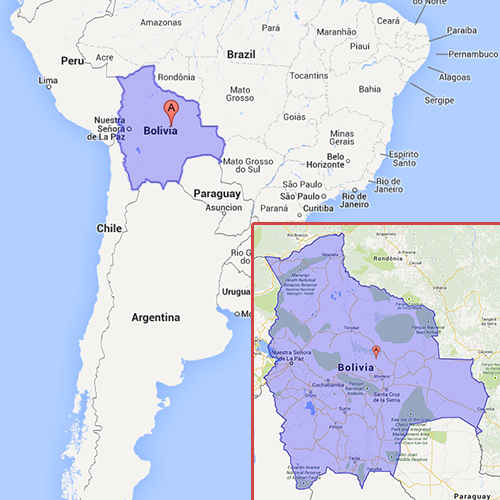EspañolNot only does the European Union not support the industrialization of coca in Bolivia, the regional organization is seeking to dissuade cultivation with sponsored alternatives. Nicolaus Hansmann, an EU official and representative of the Support for the Integral Development of Coca program, clarified the position, contrary to Bolivia’s highest law, at a workshop over the weekend.
“We do not support the processing of the coca leaf itself. We accept that farmers cultivate coca throughout entire regions [Yungas, Chapare, and Apolo]. That’s not an impediment for the EU not to act with other programs. But we do not support, for example, the plant at Villa Fatima [La Paz] where they produce tea bags with stevia [derived from the coca plant],” he explained.
“We support the production of palmetto, banana, cocoa, coffee, pineapple, and a range of other products. We also fund processing plants for bananas.” He noted success in this regard, and that in 2013 Bolivia exported 30 million boxes of bananas to Argentina.
During the workshop, “The New European Union Cooperation in Bolivia,” Hansmann also explained that the EU project is running seven projects in Bolivia for integral alternative development — advancement of the agricultural sector away from coca — to the amount of €100 million (US$137 million).
Bolivia and Legal Coca Production
According to the 2009 Constitution, adopted by referendum with 61.43 percent approval from the public, the native and ancestral coca plant is considered part of the country’s cultural heritage and a natural resource, in addition to contributing to social cohesion. The law protects the production, commercialization, and industrialization of the coca plant.

Coca farming has traditionally been considered legal when grown for consumption, medicinal use, or ritual practices in Andean villages.
The legal amount of production is determined by the Bolivian executive branch, which arbitrarily sets the number of acres allowed for legal cultivation of the plant in the country. Since the adoption of Law 1008, the number was set to approximately 30,000 acres.
Article 19 of the law states, “It is the responsibility of the Executive to know the origin and destination of coca production and define the routes and means of transport for transfer to the legal consumer markets, for which that body shall establish a permit system and controls for both producers, transporters, and traders. Any violation of this provision will make the coca illegal and subject to the penalties provided in this act.”
The EU representative commented that this law “has become obsolete after 26 years of existence” and that “there is still little detailed knowledge of the complex coca-cocaine chain.” Hasmann added, “The regional institutional framework is still too weak and the financial and technological response has been insufficient.”
Eugenio Luna, a deputy belonging to the Movement to Socialism (MAS), the same party of President Morales, responded by saying, “The approach from the EU representative is a position that can be respected, but they are the opinions of a foreigner who is not familiar with the issue, and they were fleeting proposals.”
In addition to the law regulating coca, in 2004 Morales managed to have the government allocate an extra plot of land to his party, raising the allowable area for coca farming to nearly 50,000 acres.
Evo Morales and the Coca Crusade
President Morales has repeatedly spoken before the United Nations and explained his reasons for why coca production and the chewing of the plant is legal in Bolivia, citing traditional customs as recognized by the new Constitution.
On January 11, 2013, Bolivia rejoined the UN Single Convention on Narcotic Drugs after the body voted in favor of the Andean country’s policy of coca farming.
“The coca leaf has been penalized, demonized, and criminalized internationally. Consumers have been labeled as drug addicts, producers, and traffickers,” said Morales.
Morales, a former coca growers union leader, said in February that there are many beneficial uses for this plant, including for dental health. “There are so many ways to protect your teeth. Families and people who day and night consume coca leaves do not have dental problems.”
According to a study funded by the European Union, presented in Bolivia last year after a three-year delay, over 3 million Bolivians out of a total population of 10 million consume the coca leaf in its natural state, and over 1 million chew the leaf.
 Versión Español
Versión Español












